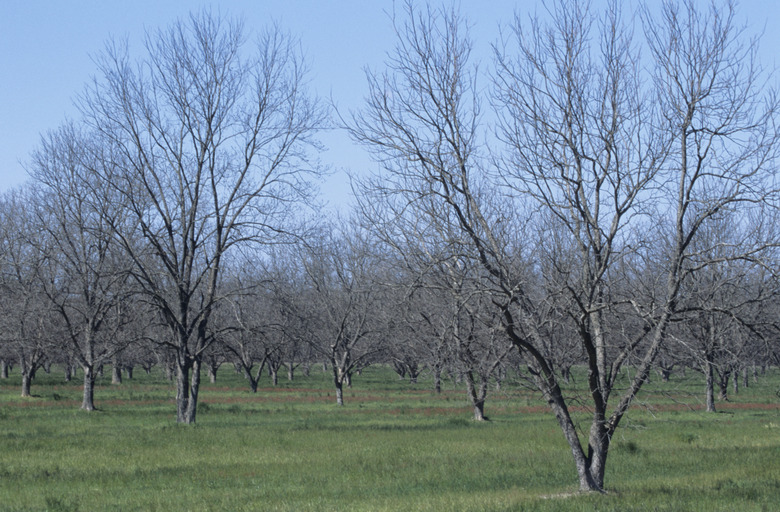Nut Trees That Grow In Florida Zones 9-10
Except for the Panhandle area and the southern tip of the peninsula, most of Florida falls in U.S. Department of Agriculture plant hardiness zone 9. The southernmost 1/4 of the peninsula is Zone 10. Florida gardeners in USDA zone 9 can grow suitable varieties of nuts such as pecan and walnut. Floridians in USDA zone 10 can try more exotic fare like macadamia nuts.
Step 1
Pecan trees are native to the Mississippi floodplain and hardy in USDA zones 6 through 9. Of the over 200 named pecan varieties, not many are adapted for use in Florida's low-chill climates. The University of Florida highly recommends the varieties "Cape Fear," "Elliott" and "Moreland" for Florida because of their disease resistance, high yield and nut quality. Pecans need a large growing space, with mature trees reaching over 70 feet tall. They also need a pollinizing variety for good fruit set, so you need at least two trees. "Elliott" is a pollinizer for "Cape Fear" and "Moreland," and "Cape Fear" pollinizes "Elliott."
Walnut
Step 1
Walnuts are also large trees. Black walnut (Juglans nigra) grows 50 to 75 feet tall with a spread of 60 feet, and you need two trees for cross-pollination. Hardy in USDA zones 4 through 9, rich-tasting nuts have twice the amount of protein as English walnuts (Juglans regia). Purdue University's New Crop program cites the cultivars "Sparrow," "Stambaugh," and "Elmer Myers" as varieties grown in the southern U.S.
Step 2
Step 3
- Pecan trees are native to the Mississippi floodplain and hardy in USDA zones 6 through 9.
- Black walnut (Juglans nigra) grows 50 to 75 feet tall with a spread of 60 feet, and you need two trees for cross-pollination.
Macadamia
Step 1
A member of the protea family native to Australia, macadamia (Macadamia integrifolia and hybrids) grows in USDA zones 9 and 10. Trees grow to 35 feet tall, with dark green, glossy evergreen leaves and showy, fragrant white or pink flowers in spring or winter. Fruits are produced in the fall. The University of Florida Cooperative Extension Service lists the hybrid cultivar "Beaumont" for home planting. Although young trees begin producing fruit after five years, larger yields occur after eight years. For easier nut picking, keep trees pruned to 12 or 15 feet tall.
Step 2
Other Nuts
Step 1
Although almond (Prunus dulcis) has a USDA hardiness range from zones 7 through 9 and appears as though it could grow in Florida, University of Florida Extension specialists advise not planting almond in Florida home orchards because it is not adapted to Florida's climates. A nut tree that can be grown in southern Florida is the cashew (Anacardium occidentale), hardy in USDA zones 10 and higher. Specialists at the University of Florida discourage growing it in the home orchard for nut production due to the presence of highly toxic compounds in the cashew's shell. A member of the poison ivy family, the oil in the cashew shell causes serious skin blistering. What the specialists advise as harvestable for the home grower is the apple-like enlarged stem that grows above the cashew seed. The apples are cooked to remove possible bitterness and either candied or dried, or the juice extracted for beverages or jams. Wear gloves to remove the apple from the portion that bears the seed.
Step 2
- A member of the protea family native to Australia, macadamia (Macadamia integrifolia and hybrids) grows in USDA zones 9 and 10.
- Although almond (Prunus dulcis) has a USDA hardiness range from zones 7 through 9 and appears as though it could grow in Florida, University of Florida Extension specialists advise not planting almond in Florida home orchards because it is not adapted to Florida's climates.
References
- University of Florida Institute of Food and Agricultural Services Cooperative Extension: Florida-Friendly Landscaping Pattern Book
- Arbor Day Foundation: Walnut, Black Juglans Nigra
- Purdue University NewCrop: Juglans Nigra L.
- California Polytechnic University Urban Forest Ecosystems Institute: Smooth-Shell Macadamia
- Naplesnews.com: Nut in my Backyard: Southwest Florida Gardens Can Grow Plenty More Than Tropical Fruits
- University of Florida Institute of Food and Agricultural Services Cooperative Extension: Deciduous Fruit for North Florida
